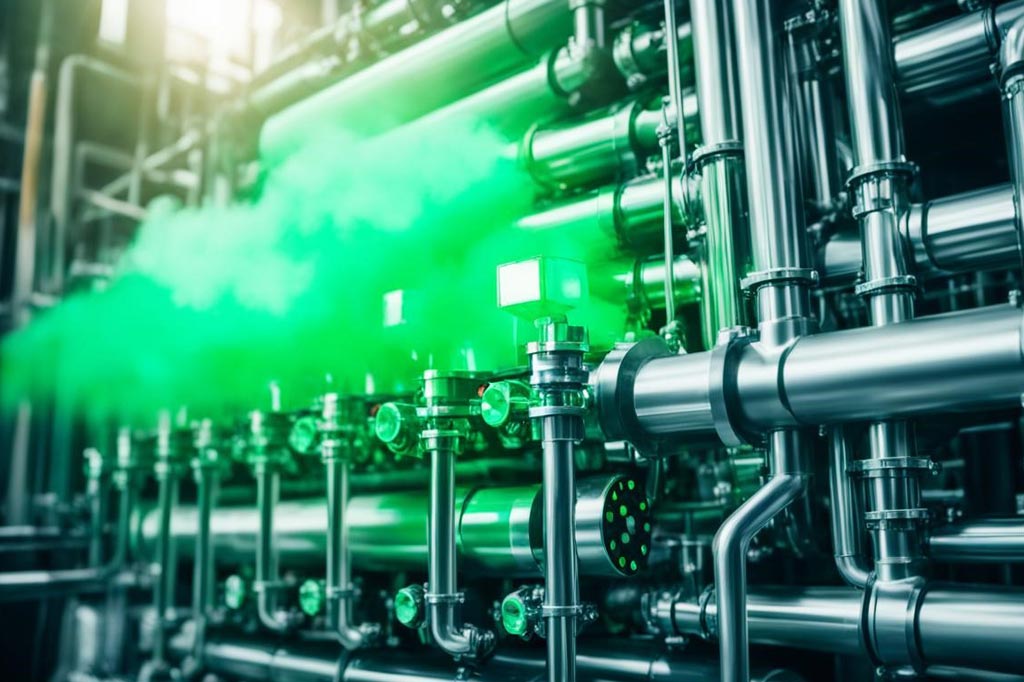
Gas filters play a critical role in ensuring the safety and efficiency of various industrial processes. By removing impurities and contaminants from gases, gas filters help to maintain clean and pure air, protect equipment, and optimize operational performance.
There are different types of gas filters available, each with its own specific uses and advantages. From automotive fuel filters that ensure smooth and reliable engine performance to diesel and gasoline filters that prevent engine damage, gas filters are indispensable in maintaining the integrity of industrial equipment.
Gas filtration, the process of filtering gases to remove unwanted particles, is essential in a wide range of applications. Manufacturing processes, power generation facilities, and oil and gas industries heavily rely on gas filtration systems to ensure high-quality air, protect sensitive equipment, and comply with environmental regulations.
- Gas filters are crucial for maintaining industrial safety and efficiency.
- Understanding different types of gas filters and their specific uses is essential.
- Gas filtration systems find application in various industries, from manufacturing to power generation.
- Gas filters improve air quality, protect equipment, and enhance operational efficiency.
- Regular maintenance and replacement of gas filters are important for optimal performance.
Understanding Gas Filters and Their Functionality.
Gas filters play a vital role in ensuring the smooth operation of various industrial equipment, particularly in automotive applications. These filters, such as automotive fuel filters, vehicle filters, diesel filters, and gasoline filters, are designed to remove impurities and contaminants from gas, promoting optimal performance and prolonging the lifespan of the equipment.
One of the key functions of gas filters is to prevent the entry of harmful substances into the fuel system, ensuring that only clean and high-quality fuel reaches the engine. By removing particles like dirt, rust, and debris, gas filters maintain the efficiency of the engine and prevent potential damage, leading to costly repairs.
Regular maintenance and replacement of gas filters are essential to ensure their effectiveness in filtering out impurities. Over time, gas filters can become clogged with contaminants, reducing their filtration efficiency and restricting the flow of fuel. Timely filter replacement is necessary to avoid fuel system malfunction and engine performance issues.
When selecting a gas filter supplier, it is crucial to choose a reliable and reputable company that provides high-quality filters. A trusted filter supplier will offer a wide range of options and ensure that the filters meet industry standards and specifications. Consider factors such as the supplier’s track record, customer reviews, and the availability of filter maintenance and replacement services.
The Importance of Gas Filter Maintenance
Adequate gas filter maintenance is crucial to ensure the proper functioning of automotive fuel systems and other industrial equipment. In addition to regular filter replacement, maintenance includes periodically inspecting the filter for any signs of damage or clogging.It is suggested to observe the manufacturer’s pointers for upkeep periods and procedures.
By adhering to proactive maintenance practices, you can prevent potential breakdowns, optimize fuel efficiency, and extend the service life of your equipment. Regularly monitoring the condition of gas filters and promptly addressing any issues can save you from costly repairs and downtime in the long run.
| Some Benefits of Regular Filter Maintenance | Considerations for Choosing a Filter Supplier |
|---|---|
| Enhanced fuel efficiency | Reputation and reliability |
| Optimal engine performance | Product quality and compatibility |
| Prevention of potential damage | Industry certifications |
| Extended equipment lifespan | Availability of maintenance services |
Ultimately, understanding the functionality of gas filters, prioritizing maintenance, and selecting the right filter supplier are crucial steps in ensuring the smooth and efficient operation of automotive fuel systems and other industrial equipment.
The Applications and Benefits of Gas Filtration Systems.
In various industrial applications, gas filtration systems play a critical role in maintaining a safe and efficient working environment. These systems are used in a wide range of industries, including manufacturing processes, power generation, and the oil and gas sector.
Gas filtration systems are designed to remove impurities and contaminants from gases, ensuring that the air quality meets the required standards. By effectively filtering out harmful particles and substances, these systems not only protect the health and safety of workers but also help to enhance the longevity and performance of industrial equipment.
One of the primary uses of gas filtration systems is in manufacturing processes. Companies rely on these systems to filter gases such as nitrogen, oxygen, and compressed air, which are used in various stages of production. By removing impurities and contaminants, gas filtration systems ensure that the gases meet the necessary purity requirements, resulting in high-quality products and seamless manufacturing operations.
Gas filtration systems are indispensable in the power generation industry as well. Power plants utilize these systems to purify the gases used in combustion processes, such as natural gas and fuel oil. By removing harmful particulates and contaminants, gas filtration systems improve the efficiency of power generation, reduce emissions, and prolong the lifespan of critical equipment.
The oil and gas industry extensively relies on gas filtration systems in various applications. For example, during oil refining processes, these systems are used to remove impurities from natural gas, preventing the buildup of contaminants that can damage pipelines, valves, and other equipment. Additionally, gas filtration systems play a crucial role in protecting sensitive components in drilling rigs, gas compressors, and other upstream equipment.
Aside from its applications in different industries, gas filtration systems offer several benefits that contribute to overall operational efficiency. First and foremost, these systems significantly improve air quality by eliminating harmful particles and contaminants from gases. This ensures a healthy and safe working environment for employees, reducing the risk of respiratory issues and other health-related problems.
Furthermore, gas filtration systems help to protect critical equipment from damage caused by impurities. By removing particles and contaminants, these systems prevent clogs, corrosion, and breakdowns, thereby reducing maintenance costs and downtime. This translates to increased productivity, improved reliability, and enhanced overall efficiency in industrial operations.
In summary, gas filtration systems are crucial for ensuring safety, maintaining air quality, and optimizing operational efficiency in a wide range of industries. These systems play key roles in manufacturing processes, power generation, and the oil and gas industry, providing reliable filtration to protect equipment and enable smooth operations. By investing in high-quality gas filtration systems, companies can safeguard their workers, enhance their productivity, and achieve long-term success.
| Industry | Application |
| Manufacturing | Filtering gases used in production processes |
| Power Generation | Purifying gases used in combustion processes |
| Oil and Gas | Removing impurities from natural gas and protecting equipment |
Conclusion
Throughout this article, we have explored the critical role of gas filters in ensuring industrial safety and maximizing operational efficiency. Gas filters play a vital role in removing impurities and contaminants from various gas sources, including automotive fuel, vehicles, and industrial equipment.
Understanding the different types of gas filters and their specific uses is crucial in making informed decisions for optimal performance. Whether it’s selecting the right filter for your vehicle or choosing a reliable supplier for your industrial filtration needs, knowledge of gas filters is essential.
By incorporating gas filtration systems into manufacturing processes, power generation, and oil and gas industries, businesses can enjoy numerous benefits. These include improved air quality, equipment protection, and enhanced operational efficiency.
Overall, investing in high-quality gas filters and maintaining them regularly is a smart choice for any industry. By prioritizing industrial safety and efficiency, companies can avoid costly breakdowns and ensure smooth operations. Gas filters are the unsung heroes of many sectors, quietly working behind the scenes to protect workers and equipment, allowing businesses to thrive.
FAQ
What is gas filtration?
Gas filtration is the process of removing impurities and contaminants from gases to ensure clean and safe operations in various industrial applications. It involves the use of gas filters, which trap and remove particles, moisture, and other harmful substances from the gas stream, preventing them from causing damage to equipment or posing risks to human health.
What are the different types of gas filters?
There are several types of gas filters available, each designed for specific applications. Some common types include automotive fuel filters, vehicle filters, diesel filters, and gasoline filters. These filters are often made with specialized materials and technologies to effectively capture and remove impurities found in particular gas streams.
What are the uses of gas filters?
Gas filters are used in various industries and applications to maintain clean and safe gas streams. In automotive applications, fuel filters ensure that fuel reaching the engine is free from contaminants that could cause engine damage. Gas filters are also widely used in power generation, oil and gas industries, manufacturing processes, and HVAC systems to remove impurities and protect equipment from damage.
How often should gas filters be replaced?
The frequency of gas filter replacement depends on several factors, including the type of gas being filtered, the level of contamination, and the specific operational conditions. However, as a general guideline, it is recommended to replace gas filters regularly according to the manufacturer’s guidelines. Regular maintenance and inspection can also help determine the appropriate replacement intervals for gas filters.
How to ensure proper gas filter maintenance?
Proper gas filter maintenance is essential for optimal performance and longevity. This includes regular inspection of the filter for signs of wear or clogging, as well as timely replacement when necessary. It is also important to follow the manufacturer’s guidelines for filter maintenance, including any recommended cleaning procedures or filter-specific considerations.
Where to find a reliable gas filter supplier?
To find a reliable gas filter supplier, you can research reputable companies that specialize in filtration systems and products. Look for suppliers with a proven track record of delivering high-quality filters and excellent customer service. Reading customer reviews and seeking recommendations from industry professionals can also help you find a trusted filter supplier.


